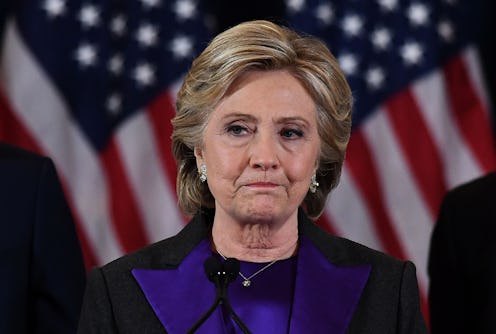News
'TIME' POY Story Nails How Clinton Lost
There's been plenty of discussion on why Hillary Clinton lost this past month. In the weeks following Election Day, some pundits attributed it to her focus on identity politics, that she didn't connect with the white working class — and the TIME "Person of the Year" cover story (which honors Donald Trump) points to that being true, at least in part. The most ironic, and for Clinton supporters, surely upsetting piece of the article crafted by TIME Politics Editor Michael Scherer is that Clinton knew how to win, but Trump distracted her by turning the debate into a morality contest on his offensive actions, statements, and dangerous temperament.
Scherer writes that "history will record that Clinton foresaw the economic forces that allowed Trump to win." Specifically, there was a pollster, Joel Benenson, who in July 2015 painted a picture of what was most worrisome to the voters. It was the same as in 2012: "When they look to the future, they see growing obstacles, but nobody having their back. They can’t keep up; they work hard but can’t move ahead," Benenson wrote in a campaign memorandum that was later leaked by Wikileaks.
In the piece, Scherer covers how the Clinton campaign launched with this messaging. When announcing her candidacy, she acknowledged that "many of you are working multiple jobs to make ends meet," and guessed these voters wanted to know, "When does my hard work pay off? When does my family get ahead?" She told them, "Now." And she repeated that in speeches and debate performances through the summer. But then one thing happened: Trump.
The long-offensive candidate grew to be even more so. The now president-elect seemed worse and worse — more and more offensive. The Access Hollywood tape leaked in which he bragged about sexually assaulting women. That was on top of all the other insults he had passed off on nearly every subgroup of the Obama coalition, and so the Clinton campaign switched gears. They made it all about him, thinking it would motivate their base (minorities, women, the educated) to turn out to the polls, Scherer argues.
And they did motivate these members of the base — it's just they weren't the people needed to win the election. Scherer writes:
The strategy worked, in a way. Clinton got about 2.5 million more votes than Trump, and on Election Day, more than 6 in 10 voters told exit pollsters that Trump lacked the temperament for the job of President. But the strategy also placed Clinton too far away from the central issue in the nation: the steady decline of the American standard of living. She lost the places that mattered most.
He goes on to quote the Trump campaign manager and now advisor Kellyanne Conway: "There’s a difference for voters between what offends you and what affects you," she said after the election. And another pollster that Scherer quoted concurred. Stanley Greenberg, who worked for Bill Clinton in 1992 wrote, "The data does not support the idea that the white working class was inevitably lost until the Clinton campaign stopped talking about economic change."
So had Trump's outrageous, offensive statements, actions, threats, and bullying not been addressed to the degree in which they were, Clinton may have won — and ultimately shut him up, turning him into the loser that he was so afraid to become. We would not have a bullying president-elect but rather an experienced policy wonk who cares and has the chops to make a difference. Clinton lost to Trump because of his temperament — even though the average American voter didn't think he was up for the job on election day.
"By seeking to condemn the dark side of politics, Clinton’s campaign may have accidentally validated it," Scherer writes. By denouncing Trump, she won him the election, and that is utterly depressing.
